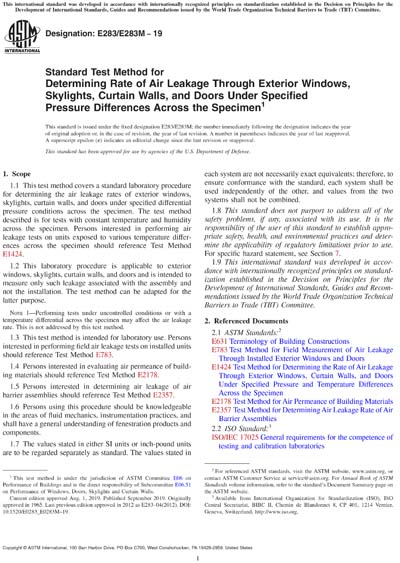Most recent
ASTM E283/E283M-19
Standard Test Method for Determining Rate of Air Leakage Through Exterior Windows, Skylights, Curtain Walls, and Doors Under Specified Pressure Differences Across the Specimen
1.1 This test method covers a standard laboratory procedure for determining the air leakage rates of exterior windows, skylights, curtain walls, and doors under specified differential pressure conditions across the specimen. The test method described is for tests with constant temperature and humidity across the specimen. Persons interested in performing air leakage tests on units exposed to various temperature differences across the specimen should reference Test Method E1424.
1.2 This laboratory procedure is applicable to exterior windows, skylights, curtain walls, and doors and is intended to measure only such leakage associated with the assembly and not the installation. The test method can be adapted for the latter purpose.
Note 1: Performing tests under uncontrolled conditions or with a temperature differential across the specimen may affect the air leakage rate. This is not addressed by this test method.
1.3 This test method is intended for laboratory use. Persons interested in performing field air leakage tests on installed units should reference Test Method E783.
1.4 Persons interested in evaluating air permeance of building materials should reference Test Method E2178.
1.5 Persons interested in determining air leakage of air barrier assemblies should reference Test Method E2357.
1.6 Persons using this procedure should be knowledgeable in the areas of fluid mechanics, instrumentation practices, and shall have a general understanding of fenestration products and components.
1.7 The values stated in either SI units or inch-pound units are to be regarded separately as standard. The values stated in each system are not necessarily exact equivalents; therefore, to ensure conformance with the standard, each system shall be used independently of the other, and values from the two systems shall not be combined.
1.8 This standard does not purport to address all of the safety problems, if any, associated with its use. It is the responsibility of the user of this standard to establish appropriate safety, health, and environmental practices and determine the applicability of regulatory limitations prior to use. For specific hazard statement, see Section 7.
1.9 This international standard was developed in accordance with internationally recognized principles on standardization established in the Decision on Principles for the Development of International Standards, Guides and Recommendations issued by the World Trade Organization Technical Barriers to Trade (TBT) Committee.
ASTM International [astm]

